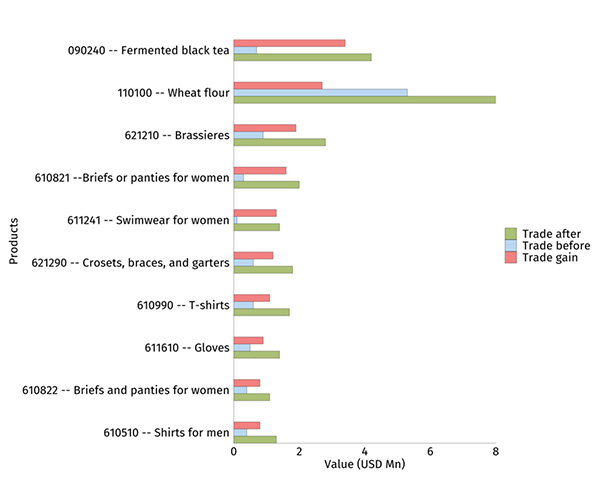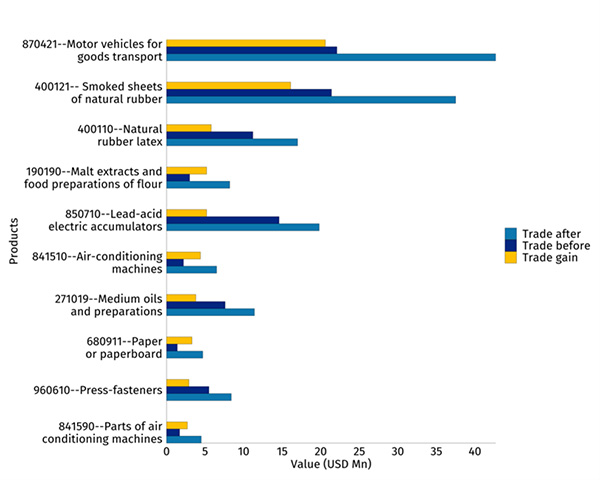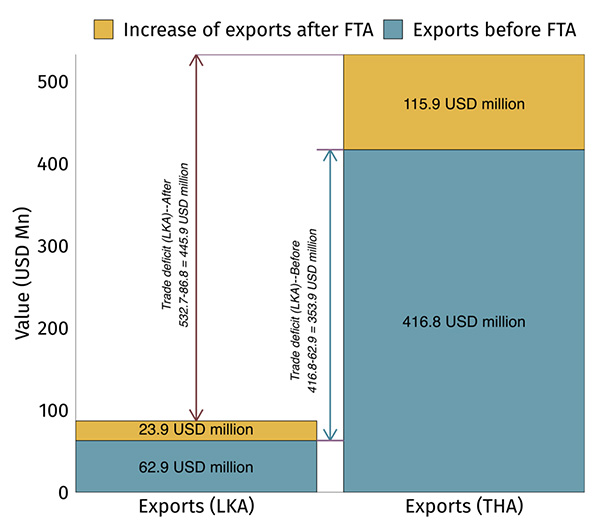Business
Overcoming Obstacles: The economic case for a Sri Lanka-Thailand FTA

By Asanka Wijesinghe and Nilupulee Rathnayake
In 2019, only 6 % of tea imported by Thailand was from Sri Lanka. This low percentage can be attributed to the difference in preferences and Thailand’s high tariffs of 90 % on imported tea, which act as barriers to Sri Lanka’s tea exports. Additionally, Thailand imposes up to 30 % tariffs on nearly 120 product lines of wearing apparel.
These high tariffs for products with a comparative advantage are not exclusive to Sri Lanka. Thailand also faces higher tariffs for vehicles, rubber, and light-electronics exports which Thailand exports competitively. This tariff structure hampers the bilateral trade of products with a higher comparative advantage for both countries.
Despite these challenges, Sri Lanka and Thailand have expedited the process of signing a free trade agreement (FTA) to boost bilateral trade by threefold to USD 1.5 billion. This article discusses the trade effect of an FTA and a way forward to maximise the gains from an FTA.
Existing Trade is Skewed
towards Thailand
 In the pre-pandemic period, Sri Lanka-Thailand bilateral trade was nearly USD 500 million. The three-year-2017, 2018 and 2019- average exports from Sri Lanka to Thailand were USD 62.9 million, while the exports from Thailand to Sri Lanka were USD 416.8 million. In 2019, Thailand was the 9th largest import source for Sri Lanka, but Sri Lanka is only the 73rd largest import source for Thailand. The mismatch resulted in a bilateral trade deficit of USD 353.9 million.
In the pre-pandemic period, Sri Lanka-Thailand bilateral trade was nearly USD 500 million. The three-year-2017, 2018 and 2019- average exports from Sri Lanka to Thailand were USD 62.9 million, while the exports from Thailand to Sri Lanka were USD 416.8 million. In 2019, Thailand was the 9th largest import source for Sri Lanka, but Sri Lanka is only the 73rd largest import source for Thailand. The mismatch resulted in a bilateral trade deficit of USD 353.9 million.
The existing exports from Sri Lanka to Thailand do not represent Sri Lanka’s typical export basket. The contribution of traditional exports like ready-made garments, tea, rubber, and coconuts is relatively low, and gems, electrical equipment, wheat flour, and activated carbon contribute to a greater extent. Technically specified natural rubber and latex are the top exports from Thailand which are essential raw materials in the value-added rubber industry of Sri Lanka.
Effect of Lowering Tariffs on Bilateral Trade to Zero
 As estimated from partial equilibrium analysis, Sri Lanka will realise a 38 % increase in exports to Thailand if tariffs are reduced to zero (Figure 2). The wearing apparel sector would be the biggest beneficiary, with exports projected to increase by 251 % from USD 6.4 million to USD 22.5 million. Figure 3A provides the top ten exports by Sri Lanka benefitting from a tariff removal by Thailand. The export effect for Thailand will be 27.8 % and Thailand’s rubber and plastic products will be increased by 71.9 % or USD 35.4 million. Products such as smoked sheets of rubber and natural latexwould benefit the most from tariff elimination, as shown in Figure 3B.
As estimated from partial equilibrium analysis, Sri Lanka will realise a 38 % increase in exports to Thailand if tariffs are reduced to zero (Figure 2). The wearing apparel sector would be the biggest beneficiary, with exports projected to increase by 251 % from USD 6.4 million to USD 22.5 million. Figure 3A provides the top ten exports by Sri Lanka benefitting from a tariff removal by Thailand. The export effect for Thailand will be 27.8 % and Thailand’s rubber and plastic products will be increased by 71.9 % or USD 35.4 million. Products such as smoked sheets of rubber and natural latexwould benefit the most from tariff elimination, as shown in Figure 3B.
Assuming an immediate phasing-out of the existing tariffs, an FTA would increase bilateral trade to USD 619.6 million by 29.1 %. This increase falls short of the ambitious goal of a threefold increase in bilateral trade, at least in the short run.
However, partial equilibrium analysis does not estimate the trade gains from new product innovations due to FDI movements. The estimates also do not account for trade effects through input-output linkages and magnification of tariff effects along the value chains. However, tariff phasing out takes time, and FTA coverages are less than 100 %.
Notes: Simulations were done for Global Trade Analysis Project (GTAP) 47-sectors using sector-specific Armington Elasticities. The base years were 2021, and 2017 for Thailand and Sri Lanka, respectively.
Maximising Trade Gains
through Offensive Lists
 An offensive list contains products for which a country has a comparative advantage, capacity for expansion, and a favourable tariff from the importing country. There are 154 such products for Sri Lanka. Notably, 81 % of the USD 27.6 million export gain from an FTA comes from these 154 product lines. Similarly, 69 % of Thailand’s export gains to Sri Lanka in an FTA comes from 147 products identified for the offensive list.
An offensive list contains products for which a country has a comparative advantage, capacity for expansion, and a favourable tariff from the importing country. There are 154 such products for Sri Lanka. Notably, 81 % of the USD 27.6 million export gain from an FTA comes from these 154 product lines. Similarly, 69 % of Thailand’s export gains to Sri Lanka in an FTA comes from 147 products identified for the offensive list.
Once ordered by the estimated export gains, nine out of the top ten products of Sri Lanka’s offensive list are from the wearing apparel sector. For Thailand, vital offensive products are rubber, electric equipment like air-conditioners and refrigerators, and motor vehicles for goods transportation.
Challenges and the Way Forward:
 Applying tariff cuts for all the products in the offensive lists is a challenge. Thailand’s high tariffs for tea and ready-made exports indicate its protectionist intent. Likewise, Sri Lanka might prefer to keep tariffs on rubber products. Significant political manoeuvring and delicate negotiations will be required to bring the coverage of the FTA to a satisfactory level. Secondly, an FTA will widen Sri Lanka’s trade deficit with Thailand by 26 % (Figure 4). Although a trade deficit is not necessarily detrimental, it does present a short-term challenge due to increased dollar outflow.
Applying tariff cuts for all the products in the offensive lists is a challenge. Thailand’s high tariffs for tea and ready-made exports indicate its protectionist intent. Likewise, Sri Lanka might prefer to keep tariffs on rubber products. Significant political manoeuvring and delicate negotiations will be required to bring the coverage of the FTA to a satisfactory level. Secondly, an FTA will widen Sri Lanka’s trade deficit with Thailand by 26 % (Figure 4). Although a trade deficit is not necessarily detrimental, it does present a short-term challenge due to increased dollar outflow.
A possible solution is tariff elimination for the products in bilateral value chains. Sri Lanka uses Thailand’s rubber and textile products to produce finished goods. If Thailand removes tariffs for these finished products, increased exports will demand more raw materials. Sri Lanka can reciprocate by eliminating tariffs on raw materials. Phasing-in of the FTA, accounting for required adjustments, will also increase the political feasibility.
Strengthening bilateral trade ties with Thailand offers additional benefits to Sri Lanka. An FTA provides an opportunity to join electric equipment manufacturing value chains and a gateway to ASEAN economies. Thus, Sri Lanka should negotiate a comprehensive trade agreement with investment promotion, trade facilitation, and competition laws. Thailand can leverage Sri Lanka’s position as a distributional hub for regional exports.
Link to Talking Economics blog: https://www.ips.lk/talkingeconomics/2023/05/11/overcoming-obstacles-the-economic-case-for-a-sri-lanka-thailand-fta/
Asanka Wijesinghe is a Research Fellow at IPS with research interests in macroeconomic policy, international trade, labour and health economics. He holds a BSc in Agricultural Technology and Management from the University of Peradeniya, an MS in Agribusiness and Applied Economics from North Dakota State University, and an MS and PhD in Agricultural, Environmental and Development Economics from The Ohio State University. (Talk with Asanka – asanka@ips.lk)
Nilupulee Rathnayake is a Research Assistant working on Macro, Trade and Competitiveness research at IPS. She holds an MSc in Development Economics from the University of Nottingham, United Kingdom, and a BA in Economics from the University of Colombo, Sri Lanka. (Talk with Nilupulee – nilupulee@ips.lk)

Business
AHK Sri Lanka champions first-ever Sri Lankan delegation at Drupa 2024

The Delegation of German Industry and Commerce in Sri Lanka (AHK Sri Lanka) proudly facilitated the first-ever Sri Lankan delegation’s participation at Drupa 2024, the world’s largest trade fair for the printing industry and technology. Held after an eight-year hiatus, Drupa 2024 was a landmark event, marking significant advancements and opportunities in the global printing industry.
AHK Sri Lanka played a pivotal role in organising and supporting the delegation, which comprised 17 members from the Sri Lanka Association for Printers (SLAP), representing eight companies from the commercial, newspaper, stationery printing, and packaging industries. This pioneering effort by AHK Sri Lanka not only showcased the diverse capabilities of Sri Lanka’s printing sector but also facilitated vital bilateral discussions with key stakeholders from the German printing industry.
Business
Unveiling Ayugiri: Browns Hotels & Resorts sets the stage for a new era in luxury Ayurveda Wellness

In a captivating reimagining of luxury wellness tourism, Browns Hotels & Resorts proudly unveiled the exquisite Ayugiri Ayurveda Wellness Resort Sigiriya. This momentous occasion, celebrated amidst a vibrant and serene grand opening on the 6th of June, heralds a new chapter in the Ayurveda wellness tourism landscape in Sri Lanka. Nestled amidst 54 acres of unspoiled natural splendour, Ayugiri features 22 exclusive suites and stands out as the only luxury Ayurveda wellness resort in the country offering plunge pools in every room, rendering it truly one-of-a-kind.
The grand opening of Ayugiri Ayurveda Wellness Resort was an enchanting event, where guests were captivated by the melodies of flutists and violinists resonating through Sigiriya’s lush landscapes. As traditional drummers and dancers infused the air with vibrant energy, Browns Hotels & Resorts’ CEO, Eksath Wijeratne, Kotaro Katsuki, Acting Ambassador for the Embassy of Japan and General Manager, Buwaneka Bandara, unveiled the resort’s new logo, marking a significant moment witnessed by distinguished guests from the French Embassy, Ayurveda and wellness enthusiasts along with officials from the Sigiriya area, LOLC Holdings and Browns Group.
“Our strategic expansion into wellness tourism with Ayugiri Ayurveda Wellness Resort Sigiriya symbolises a significant milestone for Browns Hotels & Resorts. Wellness tourism has consistently outperformed the overall tourism industry for over a decade, reflecting a growing global interest in travel that goes beyond leisure to offer rejuvenation and holistic well-being. By integrating the timeless wisdom of Ayurveda with modern luxury, we aim to set a new standard in luxury wellness tourism in Sri Lanka. Whether your goal is prevention, healing, or a deeper connection to inner harmony, Ayugiri offers a sanctuary for holistic well-being” stated Eksath Wijeratne.
Ayugiri encapsulates the essence of life, inspired by the lotus flower held by the graceful queens of the infamous Sigiriya frescoes. Just as the lotus emerges from the murky depths, untainted and serene,
Ayugiri invites guests on a journey of purity and rejuvenation, harmonised with a balance of mind, body and spirit, the essence of nature, echoes of culture and the wisdom of ancient Ayurvedic healing.
Business
HNB General Insurance recognized as Best General Bancassurance Provider in Sri Lanka 2024

HNB General Insurance, one of Sri Lanka’s leading general insurance providers, has been honored as the Best General Bancassurance Provider in Sri Lanka 2024 by the prestigious Global Banking and Finance Review – UK.
The esteemed accolade underscores HNB General Insurance’s unwavering commitment to excellence and its outstanding performance in the field of bancassurance. Through dedication and hard work, the HNB General Insurance team has continuously endeavored to deliver innovative insurance solutions, cultivate strong relationships with banking partners, and provide unparalleled service to customers nationwide. This recognition is a testament to the team’s dedication and relentless pursuit of excellence in the bancassurance business.
“We are honored to receive this prestigious award, which reflects our team’s tireless efforts and dedication to delivering value-added insurance solutions and exceptional service through our bancassurance partnerships,” said Sithumina Jayasundara, CEO of HNB General Insurance. “This recognition reaffirms our position as a trusted insurance provider in Sri Lanka and motivates us to continue striving for excellence in serving our customers and communities.”












